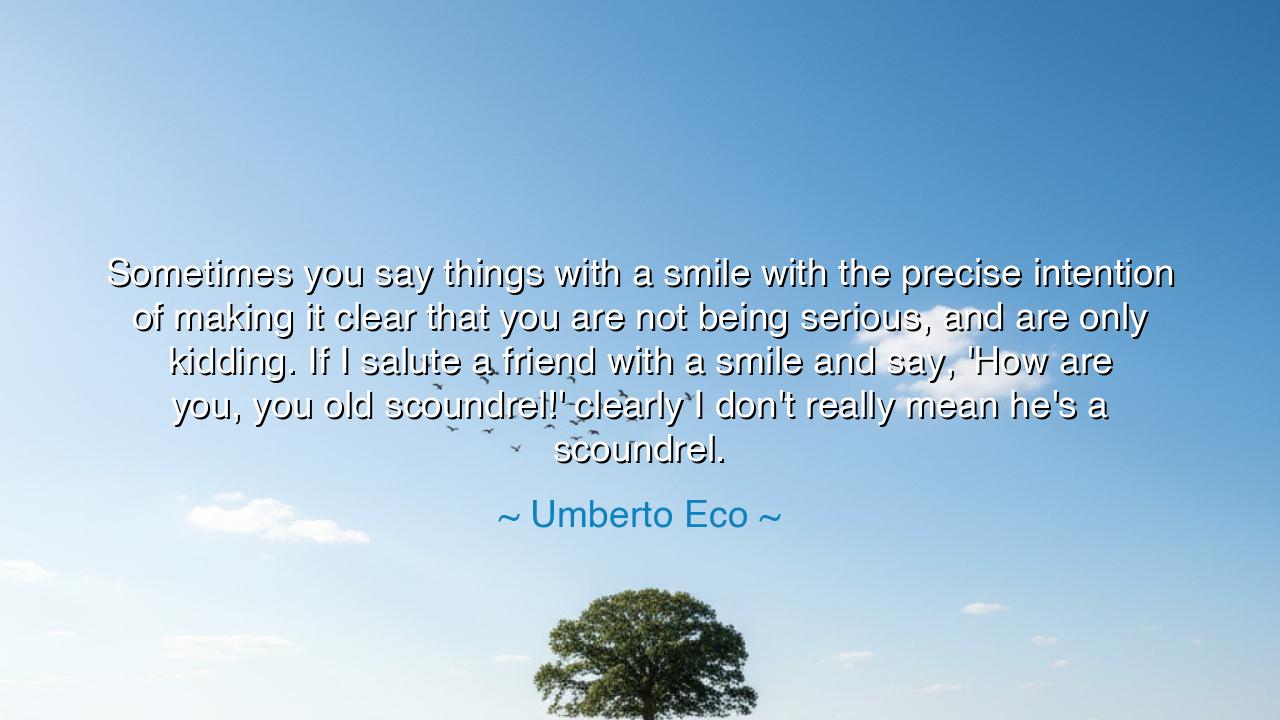
Sometimes you say things with a smile with the precise intention
Sometimes you say things with a smile with the precise intention of making it clear that you are not being serious, and are only kidding. If I salute a friend with a smile and say, 'How are you, you old scoundrel!' clearly I don't really mean he's a scoundrel.






The words of Umberto Eco, wise and playful, carry the weight of both philosophy and laughter: “Sometimes you say things with a smile with the precise intention of making it clear that you are not being serious, and are only kidding. If I salute a friend with a smile and say, 'How are you, you old scoundrel!' clearly I don't really mean he's a scoundrel.” In this teaching, Eco reveals the ancient power of tone and expression—the ways in which humans use gestures, not only words, to shape meaning. For the smile is not decoration, but language in itself, softening the sharp edge of speech and transforming insult into affection.
To call a man “scoundrel” with coldness is to wound him. But to call him the same with a smile, and in friendship, is to crown him with humor and camaraderie. The word is unchanged, yet the meaning is reborn. This is the heart of Eco’s wisdom: that language is never naked, but clothed in tone, in gesture, in spirit. It is not the word alone that matters, but the intention behind it, carried in the subtle grace of a smile.
The ancients knew this truth well. In the dialogues of Socrates, irony was often his greatest weapon. He would praise his companions as “wise” while smiling, knowing and signaling to all that he was provoking thought, not giving flattery. His smile was the bridge between word and meaning, between jest and seriousness. Without the smile, his irony would have been offense; with it, it became teaching. Eco’s reflection belongs to this same lineage: that human beings, in their subtlety, weave truth and jest together with expression.
History offers us countless examples of this delicate balance. Consider Abraham Lincoln, who often used humor and gentle irony to soften the bitterness of politics. In moments of deep national division, he would joke warmly, his words edged with satire but his face carrying kindness. Those who heard him understood his meaning—not only through the text of his words, but through the smile that revealed his spirit. His laughter became a balm in troubled times, and his humor carried weight because it was rooted in humanity, not cruelty.
Eco’s insight also warns us of the dangers of forgetting this truth. When words are divorced from tone, when smiles are absent, misunderstanding blooms. This is why letters, emails, or writings without gesture often carry risk—they lack the smile that signals playfulness, leaving only the bare blade of the word. Misinterpretation has kindled quarrels, broken friendships, even ignited wars. Thus the ancients prized face-to-face conversation, where tone, gesture, and smile gave meaning fuller than text alone.
The lesson here is profound: be mindful not only of your words, but of how you adorn them. A smile can transform reproach into jest, sarcasm into intimacy, and irony into wisdom. The power of the human face is as great as the power of the human tongue. To speak without warmth is to risk being misunderstood; to speak with a smile is to reveal intention, to remind the listener of friendship, to clothe your words in gentleness.
Therefore, let us act with wisdom. When we jest, let us smile, so our words are understood. When we critique, let us temper our sharpness with kindness, so truth is received without bitterness. And when we greet our friends, let our words carry both laughter and affection, reminding them that behind every phrase lies the bond of fellowship.
Carry forward the wisdom of Umberto Eco: “Sometimes you say things with a smile to make it clear you are not being serious.” Let it remind you that meaning is not forged by words alone, but by the heart that delivers them. For in the end, it is not only what we say that shapes the world, but the spirit with which we say it—and a smile can turn even the harshest word into a hymn of friendship.






AAdministratorAdministrator
Welcome, honored guests. Please leave a comment, we will respond soon